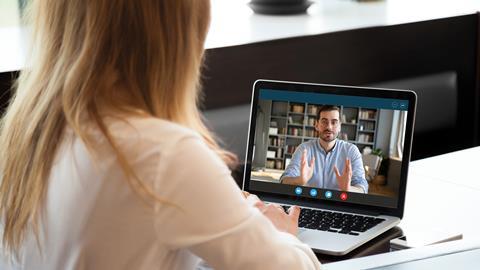As we return to the new ‘normal’ there are some features of pandemic life that will remain. It seems working from home (at least partly) is here to stay and many client/internal meetings will continue to be held on Zoom or Teams. Virtual interviews are almost certainly here to stay. Why? It will allow firms to run interviews more efficiently and prospective candidates can attend them without having to have a series of ‘dentist appointments’. Virtual interviews can also be beneficial for promoting social mobility and diversity by making it easier for candidates to attend interviews. I have recently been interviewing candidates virtually and this article pulls together some tips for when your virtual foot is in the door.

Eye contact
This is a bit of a strange one. Eye contact is such an important part of the way we communicate. By maintaining eye contact, we are more likely to believe what the person is saying is true. However, eye contact over video calls is complicated. Although you may be looking in the eyes of the person on screen, their image of you will show you looking downwards away from the camera. Although it is important to look at your interviewer to see their reactions to what you are saying, you should split this up with periods of looking into the camera. This will give the effect of eye contact. You should do the same while being asked questions.
An additional tip is to remove your own video off the screen so you cannot see yourself. This should help reduce distractions and focus your attention on those on the video that really matter.
Preparation
The need to prepare for an interview is obvious. However, there are additional ways you can prepare for video interviews that are not possible in person. You have the option to have notes in front of you, or other prompts. This can be helpful if set up correctly, for example by using buzzwords on sticky notes on the wall behind your screen. It is best to have these prompts higher up to prevent looking down. Looking upwards while talking can look more natural.
You want to avoid any lengthy notes or paragraphs on your desk. I have interviewed where you can tell the candidate has started to read off the page in front of them – this is the opposite of engaging.
Time
Although it might be easier to manage your time attending an interview when working from home, you should still make sure you block out your diary. There is a habit of colleagues thinking you should always be available while working from home. You also need to ensure you are not on a client call or other meeting immediately before the interview, which could overrun. Block out your calendar at least 15 minutes before and for at least an hour – while being in the interview you do not want to be thinking about an upcoming work call you might be late for.
If you are not able to make the interview because of another meeting or call, let the interviewer or your agent know. They will understand and you should be able to reschedule.
Technology
Test, test, test. Another reason you blocked out your calendar 15 minutes before your interview is to ensure you have time to test your technology. Set up a test video call and check the camera angles (remove that washing in the background). If you are able to, ask a friend to join the call to ensure the sound and video is all working without issues. If you do not trust your internet connection, disconnect any other devices that might be on the Wi-Fi. There is nothing worse than a bad connection dropping in and out. Regardless of how good a candidate you may be, it is unlikely you will be taken through to the next stage if you cannot communicate.
Make sure you turn off emails and put your phone away. Reduce those distractions so you can focus solely on the interview.
The usual
It is a different style of interview but the usual rules apply. Get out of those pyjamas and into a suit/smart office wear. Your interviewers are unlikely to be fully suited working from home but it is always better to be overdressed than underdressed.
Showing your personality and making a connection over video is difficult. Use your question time at the end of the interview to try and ask questions specifically catered to your interviewer. Spend time speaking about your hobbies if it is natural and see what connections you can make.
Stay calm and take your time in answering questions. It is scary being interviewed and the interviewers know it – they want you to do well and will give you a chance.
Ollie Grech, a solicitor at Devonshires, is an executive committee member of the Junior Lawyers Division
































No comments yet